Turkish State News Agency Finds Iran Biggest Obstacle To Iraq’s Stability
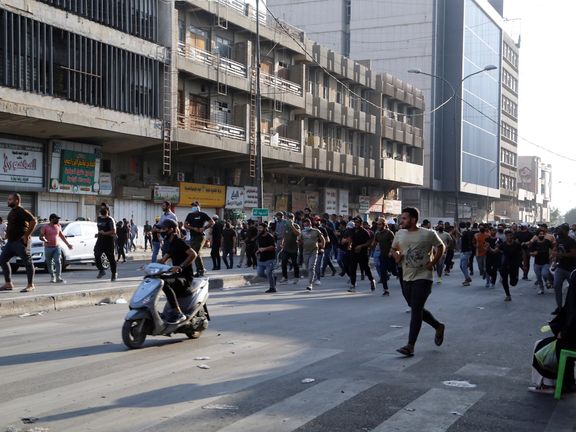
Turkish state-run news agency ran an opinion piece Monday arguing Iran is the biggest single threat to Iraq’s stability.

Turkish state-run news agency ran an opinion piece Monday arguing Iran is the biggest single threat to Iraq’s stability.
The piece described the state-linked Popular Mobilization Forces – which Iran helped set up in fighting against the Islamic State group – as a means just to strengthen Iran's military presence as part of a regional strategy also pursued in Lebanon, Syria, and Yemen.
The writer portrays Iran as directly interfering in internal Iraqi affairs for at least 20 years, not just through its relationship with militias but with missile attacks and influencing elections. Late in 2021, Iraq's Supreme Court rejected appeals by pro-Iran Shi'ite parties against results of a parliamentary poll in which they performed poorly.
Iraq has been a battlefield for influence between the United States and Iran since the 2003 US-led invasion, which toppled Saddam Hussein and created a path to power for a Shi'ite majority whose parties had been suppressed and had been based in Damascus or Tehran.
Turkey has long extended its influence in Iraq, especially in the Kurdish-held north and among allied Turkmen groups.
The Turkish news agency article portrayed visits to Iraq by Esmail Ghaani, leader of Iran’s extraterritorial Quds Force, as an example of Iran obstructing stability. It also mentioned the 2020 attack by rioters on the Baghdad office of the Kurdistan Democratic Party, the Kurdish party closest to Ankara.
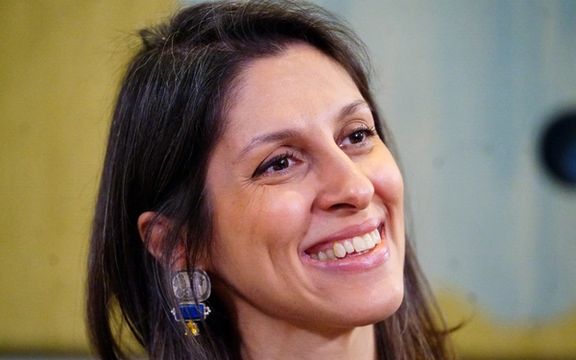
British Iranian Nazanin Zaghari-Ratcliffe says she saw five foreign secretaries change during six years of her detention in Iran without a deal to free her.
"That is unprecedented given the politics of the UK…What's happened now should have happened six years ago. I shouldn't have been in prison for six years," Zaghari-Ratcliffe said at a press conference in Westminster Monday, days after she regained her freedom.
Zaghari-Ratcliffe's MP Tulip Siddiq said she would be calling for a review by the Foreign Affairs Select Committee of the British parliament to investigate the delay in her release.
She was freed after the UK paid a four-decade-old £400m ($522 million) debt to Iran. Iranian state media in 2021 cited unidentified Iranian officials as saying that the British-Iranian aid worker would be freed once the debt had been paid. Iran's foreign minister Hossein Amir-Abdollahian last week claimed that the payment by Britain had nothing to do with the release of the Zaghari-Ratcliffe and Anoosheh Ashoori.
At the press conference she pointed out that "justice in Iran does not have any meaning" and apparently referring to Iran's negotiations with world powers over its nuclear issue, said that the freedom of dual nationals "should not be linked to international agreements."

Zaghari-Ratcliffe disclosed that soon after her arrest Iranian interrogators told her that she will be freed when the UK pays the money.
Following her release, Iran’s hardliner media continued to accuse her and other British- Iranian detainees of spying and highlighted that Tehran got paid to free them.
Recalling her experience in detention, she said it would always "haunt" her but declined to speak about her ordeal in solitary confinement, presumably due to the presence of her seven-year-old daughter Gabriella at the press conference.
The British Foreign Secretary Liz Truss claimed credit for negotiating a furlough for British-American-Iranian wildlife conservationist Morad Tahbaz, along with the release of Nazanin Zaghari-Ratcliffe and Anoosheh Ashoori.
"The world should come together to help other prisoners," she said, referring to other dual nationals still held in Iran including Tahbaz.
Morad Tahbaz, 66, was released from prison on furlough on the same day Zaghari-Ratcliffe and Ashoori left Iran to return to Britain.
Tahbaz's daughter, Roxanne, said Monday he had been taken back to prison two days after being released on furlough. She was in the press conference by the invitation of Zaghari-Ratcliffe and read a statement to bring attention to her father's circumstances and the family's plight. The family say he has gone on hunger strike.
“It’s been over four years now since my father was detained and my mother was put on a travel ban in Iran,” his daughter told the press conference Monday. "I’m here today to ask the question of why my father is the only UK-born national who has been abandoned and left behind there.”
Tahbaz's family fear he may fall through the diplomatic cracks with his triple nationality.
"He did not think that the UK government would abandon him. He was born in the UK," a family member who asked not to be identified told the BBC.
Tahbaz was arrested during a crackdown on environmental activists in January 2018.
There were contradictory statements on Monday whether he was taken to a “residential place” or was still in prison.
There are two more British-Iranian citizens still behind bars in Iran, labor rights activist Mehran Raoof and lawyer Shahram Shirkhani both of whom are serving ten years in jail for alleged spying.
Iran is still holding several other western dual nationals including American-Iranians Siyamak Namazi and his elderly father Bagher, American-Iranian businessman Emad Sharghi, and German-Iranian rights activist Nahid Taghavi.
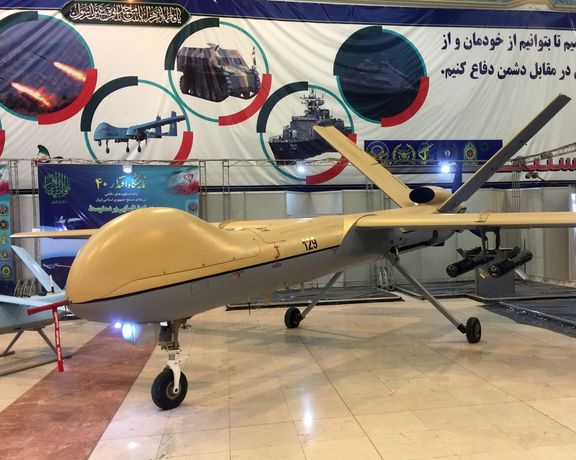
The Jerusalem Post cited Monday the defense establishment reporting that US jets on February 14 shot down near Iraq’s Erbil two Iranian drones flying towards Israel.
The actions occurred around the time of an Israeli drone attack on an Iranian airbase in Kermanshah province that damaged Iran’s drone fleet.
The Israeli attack was followed by an Iranian ballistic missile strike on Erbil March 13, targeting what Tehran said was an Israeli intelligence base that allegedly organized the drone strike, although an Israeli air strike in Syria that killed two Iranian soldiers may also have prompted Iran’s response.
In February the Israeli air-force said its F-35 jets had downed two Iranian Shahed-197 drones ferrying weapons for Palestinians in Gaza. The Israeli military claimed the drones, one approaching from the south and the other from the east, were brought down without entering Israeli airspace “in coordination with [un-named] neighboring countries.”
Increasing tension between Israel and Iran comes as Tehran’s talks with world powers over reviving the 2015 nuclear deal have been struggling to conclude. Israel opposed the 2015 agreement, the JCPOA (Joint Comprehensive Plan of Action), which limited Iran’s nuclear activities and removed international sanctions. For over a decade Israel has carried out attacks on the Iranian atomic program including killing scientist and drone strikes.
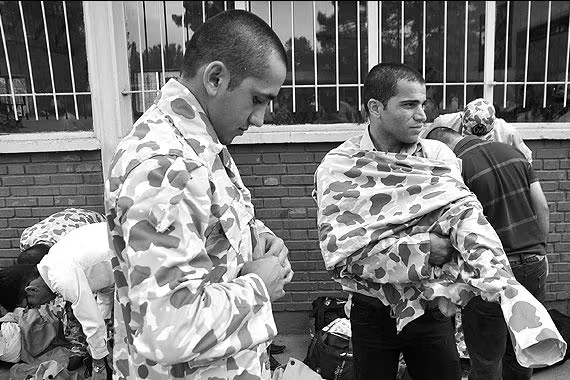
A young military conscript in southern Iran has killed four of his fellow servicemen and took another hostage, local media reported on Monday.
Mehr News Agency quoted an informed source as saying that the conscripted soldier began the killing spree in one of the barracks of the southern province of Bushehr after his request for leave was denied. Mehr News later changed its initial report, deleting the reference to the motive of the soldier, saying it is under investigation.
According to the source, the hostage was released in the port city of Deylam and the perpetrator arrested.
According to Iran’s constitution, all men over 18 years old must serve in the military for about two years otherwise they cannot apply for a passport to leave the country. Most of them are drafted into the traditional Army, but some with the right connections serve with the Revolutionary Guard where conditions are much better.
In January, Iran announced it would reinstitute a buy-out scheme for the country’s compulsory military service, but canceled plans just one day after it was reported following widespread criticism by citizens and officials.
The new fees announced for the buy-out scheme that ranged between about $10,000 and $20,000 had shocked people in Iran whose average salaries are less than $200 a month. Many social media users had slammed the decision that would only be possible for the rich to afford.
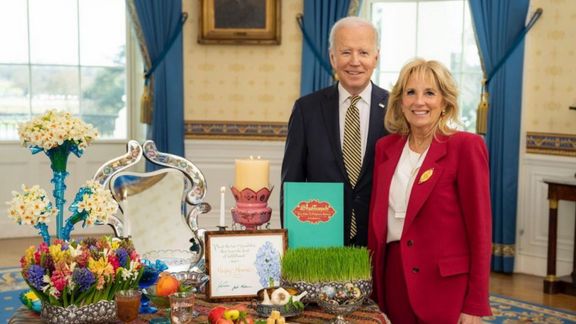
Unlike their predecessors, the US President and Secretary of State this year made no mention of Iran or the aspirations of Iranians in their Noruz messages.
In their messages, President Joe Biden and Secretary of State Antony Blinken made no mention of politics and the hostilities that have persisted for over four decades between the US and the Islamic Republic.
The White House omitted any reference to Iran at a time of sensitive negotiations to revive the 2015 nuclear deal, while a reference to freedoms and human rights was customary in previous presidential Noruz (Nowruz) messages going back to former President Barack Obama and George W Buch.
Former President Donald Trump was more direct in his messages. In 2019, he expressed dismay that the Iranian people were "unable to share fully in the joy" of the occasion and they marked the arrival of spring "under the heavy burden of the oppression of their country’s ruthless and corrupt regime.”
"In solidarity with the people of Iran, who yearn for a future of liberty, opportunity, and prosperity, the United States of America continues to condemn the dictatorial Iranian regime.We pledge never to turn a deaf ear to the calls of the Iranian people for freedom, and we will never forget their ongoing struggle for human rights," Trump told Iranians.
Referring to the literal translation of Noruz as "new day" in his message this year, the Trump Secretary of State Mike Pompeo said he prayed that a "new day", presumably regime change, for Iranians "was not far".
US Special Presidential Envoy for Hostage Affairs Roger Carstens, however, raised the issue of American citizens held in Iran in his message. Carstens said in a tweet that Baquer (Bagher) Namazi and his son Siamak Namazi, Emad Shargi (Sharghi), and Morad Tahbaz (also a UK citizen) should have been able to celebrate Noruz "in freedom and surrounded by their loved ones.”
Iranian authorities have accused the detainees, American-Iranian dual nationals, of espionage and other security related crimes and sentenced them in unfair trials without due process of law. The US says they should be freed if an agreement is reached to restore the 2015 nuclear deal between Iran and world powers, the Joint Comprehensive Plan of Action (JCPOA) but Iran insists that their case is separate from the nuclear talks.
Israeli Prime Minister Naftali Bennet's Noruz message was also politically charged and highlighted "regime change" in Iran. In a video message in English sent to Iran International TV, Bennett said he hoped Iranian and Israeli people could restore the centuries-old friendship between Jews and Iranians "in a near future" and there would be "a change in the terrible Iranian regime".
Bennett said Israel knows the vast majority of Iranians oppose the policies of “the ayatollah regime”, which spends money on “missiles, terror” rather than on their children and on education and added that he hopes there would be peace "in a short time".
The message from London, by Prime Minister Boris Johnson, was also devoid of any reference to Iran or Iranians. Instead, in a tweet Johnson mentioned "Afghan friends marking their first Nowruz here in the UK."
Without any mention of politics, the Canadian Prime Minister Justin Trudeau in his statement on Noruz and video message spoke of Noruz as a cultural event celebrated by over 300 million people around the world, including Iranian, Afghan, Kurdish and Central Asian ethnic groups as well as Zoroastrian, Baha’i, and Ismaili religious communities and the importance of the contributions that they make to Canada.
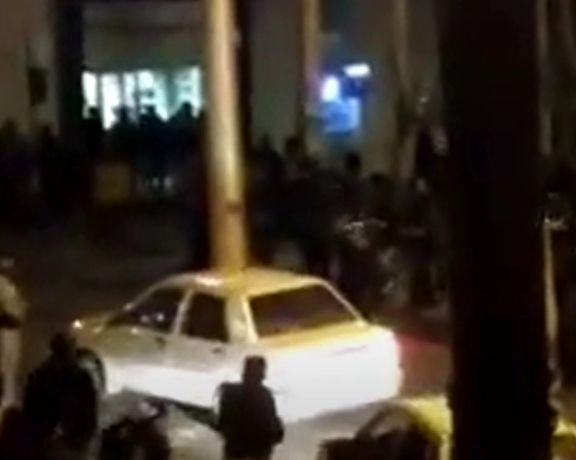
Social media users reported security forces clashing with gatherings of people celebrating Noruz (Nowruz) in the mainly Kurdish city of Oshnavieh, in Iran.
Sunday evening, special forces attacked the people of Oshnavieh in northwest Iran to prevent the celebrations from taking place. Clashes broke out when people resisted, and security forces started beating them with batons and fired tear gas.
The situation was reported tense in many Kurdish cites as residents ignored warnings by the government against celebrating the ancient Iranian New Year according to Kurdish traditions with large get-togethers involving traditional dance and music.
The Kurdish political parties, which support autonomy, are based in neighboring northern Iraq, where there has been a self-governing Kurdish entity since 1991.
For over two and half millennia, long before the advent of Islam in the 7th century, Noruz (Nowruz), which falls on spring equinox, has been marked across central Asia as far as China. Noruz literally translates as 'New Day’ but has long taken on a political significance for Kurds in Turkey, Iran, Syria and Iraq.
Iran’s oldest Kurdish party, the Kurdish Democratic Party of Iran (KDPI), supports a self-governing Kurdish entity within a federal state. Two of its leaders – Abdolraham Ghassemlou and Sadegh Sharafkandi – were murdered in Europe in 1989 and 1991, possibly on orders from Tehran.